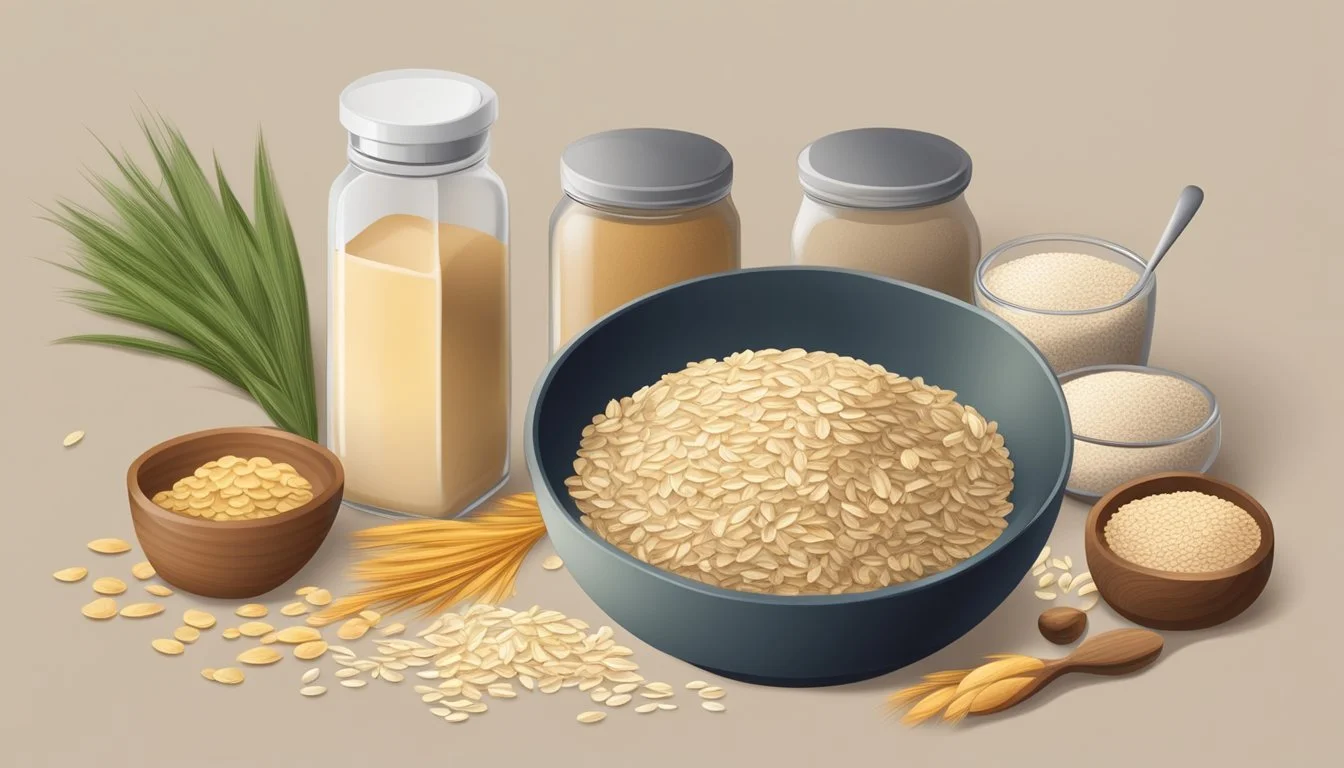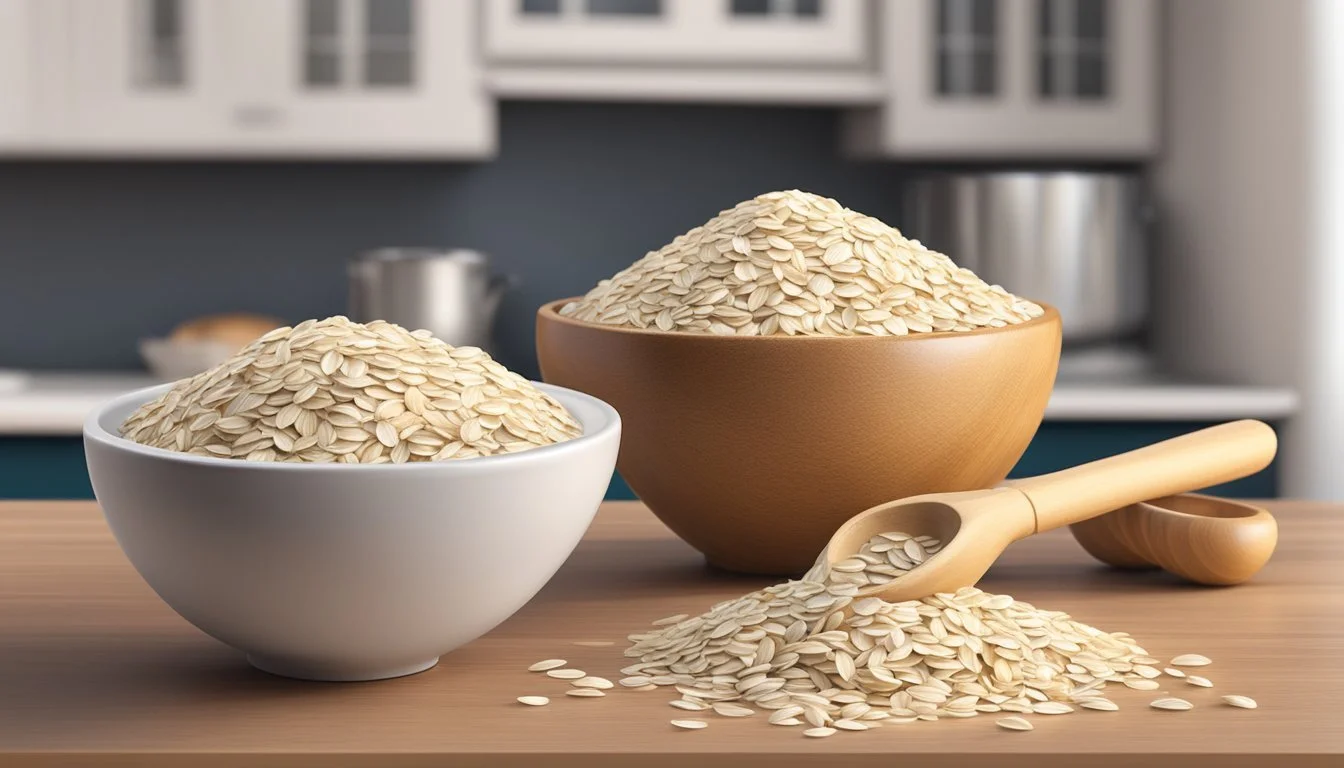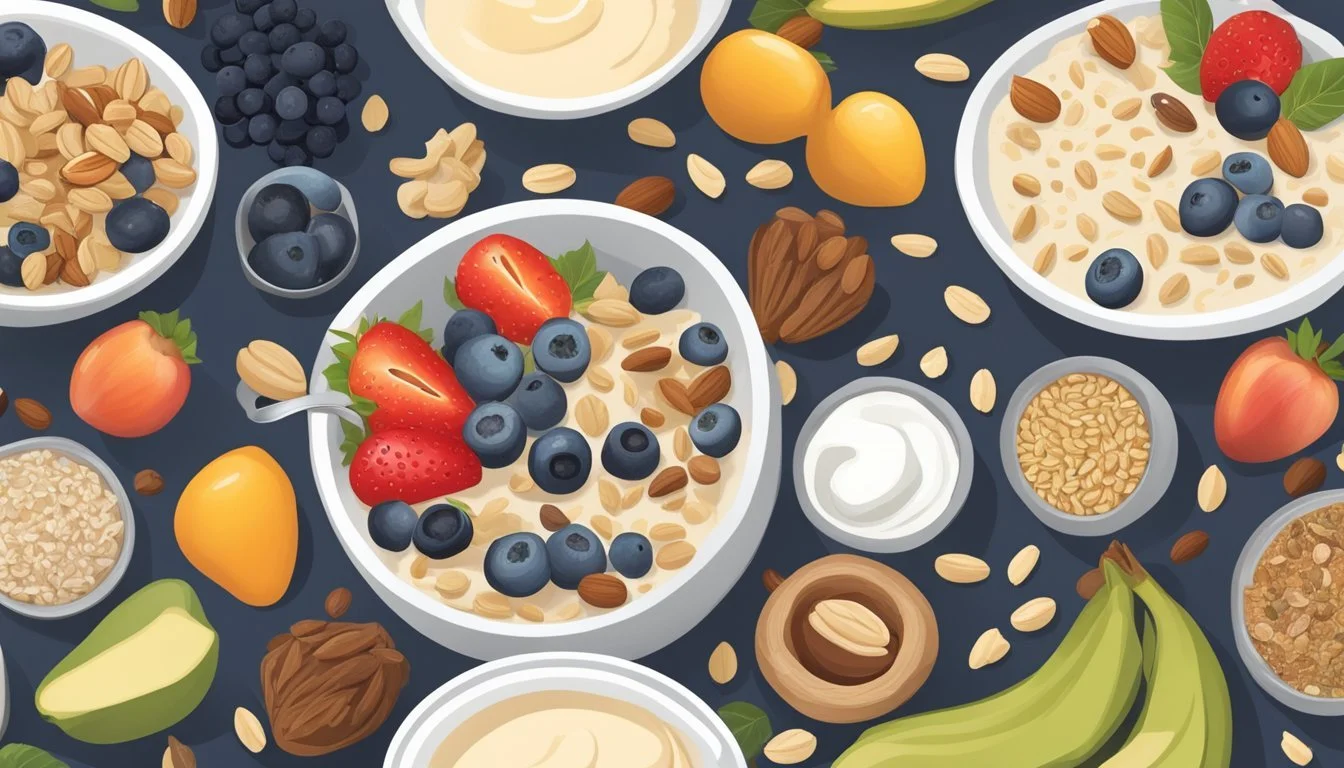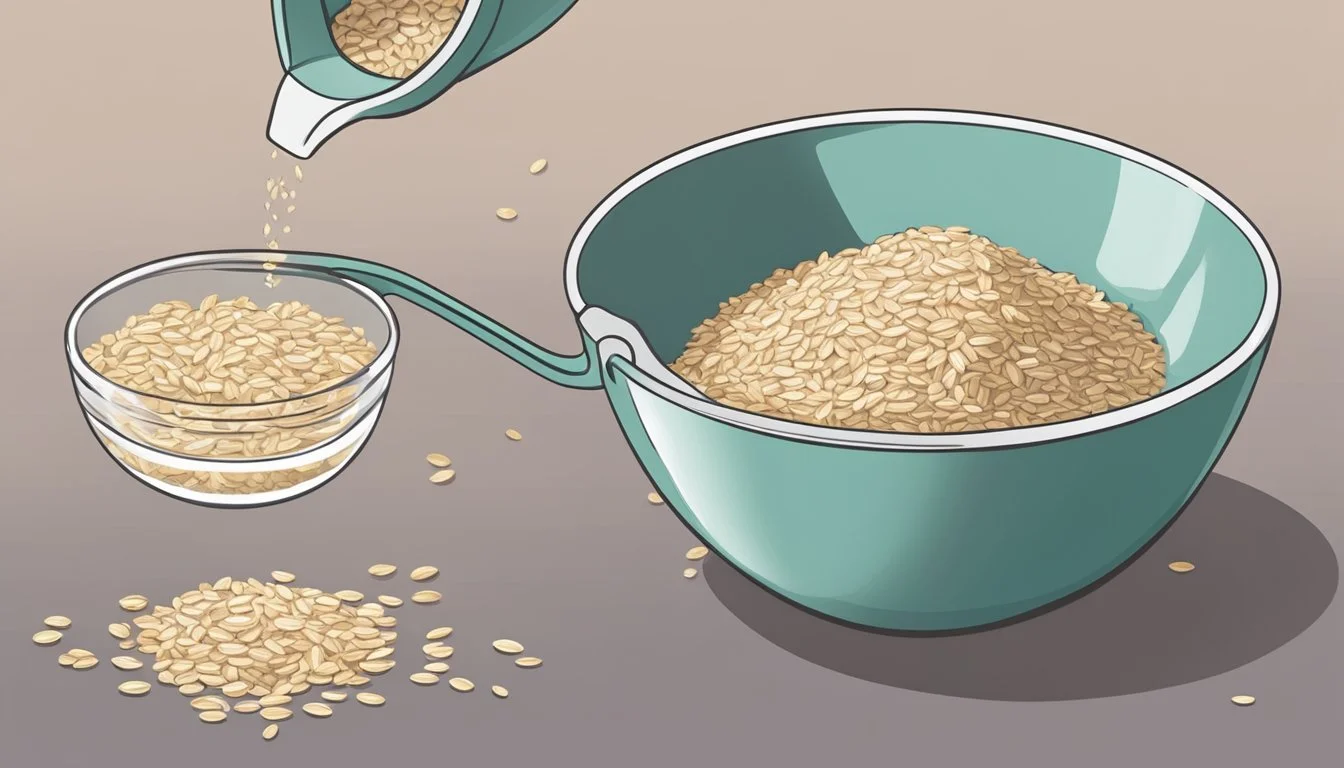Quick Oats Substitutes
Top Alternatives for Baking and Cooking
When a recipe calls for quick oats but the pantry is bare, several excellent substitutes can serve the same purpose. Coconut chips are a great replacement for quick oats in no-bake recipes, offering a unique texture and flavor profile. You can swap them in a one-to-one ratio, yielding a delightful and crunchy variation to your dish.
Another viable substitute is old-fashioned oats, which can take the place of quick oats in many recipes. These oats are larger and cook more slowly, yet they can often be used interchangeably with quick oats. Just keep in mind the slightly longer cooking time required, making them perhaps not ideal for every quick-fix recipe.
Other options include grated carrots or apples, which add both moisture and a subtle sweetness to your dish. These alternatives not only replace the texture of quick oats but also enhance the nutritional value of your meal. Whether you're baking or preparing a hearty breakfast, a bit of innovation can easily fill the gap left by missing quick oats.
Understanding Quick Oats
Quick oats are a popular choice in many kitchens due to their convenience and nutritional benefits. They offer a quick and easy option for a nutritious meal, with various advantages and specific characteristics setting them apart from other oats.
The Basics of Oats
Oats come in several forms, each differing in texture and cooking time. Quick oats are derived from whole oats that have been pre-cooked, dried, and pressed into thinner flakes. This process makes them cook faster than traditional rolled oats.
Oat Forms:
Whole Oats: Least processed, takes the longest to cook.
Steel-Cut Oats: Coarsely chopped, with a chewy texture.
Rolled Oats: Steamed and flattened.
Quick Oats: Finer, thinner, and quicker to cook.
Benefits of Quick Oats
Quick oats are convenient and versatile in various recipes, from porridge to baking. They provide a balanced nutritional profile, offering essential vitamins, minerals, and fiber.
Key Nutrients:
Fiber: Helps in digestion and maintaining healthy blood sugar levels.
Protein: Supports muscle repair and growth.
Vitamins & Minerals: Includes B-vitamins, iron, and magnesium.
Quick oats also have a lower glycemic index compared to some other cereals, which can be beneficial for maintaining stable blood sugar levels. Their ease of preparation makes them an ideal option for busy mornings or quick snacks.
Characteristics of Quick Oats
Quick oats are known for their fine texture and fast cooking time. They typically require just 1-2 minutes on the stove or microwave, making them extremely convenient.
Compared to old-fashioned oats, quick oats have a softer, less chewy texture, making them suitable for those who prefer smoother oatmeal. Their thinness allows them to absorb liquids quickly, resulting in a creamy consistency.
Quick oats also blend well in baking recipes, such as cookies and muffins, as they integrate easily without needing long cooking times.
They are often used interchangeably with rolled oats in many recipes, but their unique texture and cooking properties might slightly alter the final product.
Common Substitutes for Quick Oats in Baking
When baking, quick oats can be substituted with various ingredients to suit different recipes and dietary needs. These substitutes can alter the texture, flavor, and nutritional profile of your baked goods.
Using Oat Flour
Oat flour, made from finely ground oats, is an excellent substitute for quick oats in baking. It provides a similar mild, nutty flavor.
This gluten-free option works well in muffins, oatmeal cookies, and other recipes needing a smooth texture. Use a 1:1 ratio when substituting, but be aware that oat flour retains more moisture. You may need to adjust the liquid content in your recipe slightly.
Rolled Oats and Old-Fashioned Oats
Rolled oats and old-fashioned oats can replace quick oats directly in most baking recipes. They have a heartier texture due to minimal processing.
For cookies and muffins, simply use them in equal amounts. These oats may increase the chewiness of your baked goods. If a finer texture is desired, pulse them in a food processor to break them down to a consistency similar to quick oats.
Wheat Flour and Spelt Flour
Wheat flour and spelt flour are traditional substitutes for oats in baking. These flours add a slightly nutty flavor and denser texture.
They are best used in recipes like muffins and breads. Replace oats with these flours in a 1:1 ratio. These flours contain gluten, making them unsuitable for gluten-free diets. Adjust the liquid in the recipe, as these flours can absorb more or less moisture than oats.
Almond Meal and Coconut Flakes
Almond meal and coconut flakes offer unique textures and flavors when substituting for quick oats. Almond meal adds a nutty richness, and coconut flakes provide a chewy texture.
For recipes such as cookies or no-bake treats, almond meal can be used in a 1:1 ratio. Coconut flakes are ideal for adding texture to muffins or bars. Use ample coconut flakes, keeping in mind they won't fully mimic the texture of oats.
Gluten-Free Alternatives for Quick Oats
When seeking gluten-free substitutes for quick oats, there are several nutritious options available. These alternatives provide excellent sources of dietary fiber and healthy fats while catering to dietary restrictions such as celiac disease. The following are some effective options that can be used in a variety of recipes.
Quinoa and Quinoa Flakes
Quinoa is a gluten-free grain rich in protein and dietary fiber. It has a slightly nutty flavor and can be used both cooked or in its flake form.
Quinoa flakes are created by flattening the quinoa seed. They cook quickly, making them an ideal substitute in recipes that call for quick oats.
Key Points:
High in protein and fiber
Cooks quickly
Nutty flavor
Quinoa flakes can be used in one-to-one ratios to replace quick oats in porridge, baking, or even no-bake recipes.
Buckwheat and Buckwheat Groats
Buckwheat is a gluten-free seed that is often mistaken for a grain. It is particularly high in fiber and essential amino acids.
Buckwheat groats are the hulled seeds of the buckwheat plant. They have a crunchy texture when raw, but can also be cooked to achieve a softer consistency.
Key Points:
Gluten-free and nutritious
High fiber and amino acids
Distinct, earthy flavor
For recipes, buckwheat groats can be substituted in similar volumes to quick oats. They add a unique texture and taste, especially beneficial in baking and breakfast dishes.
Rice Flakes and Brown Rice
Rice flakes are flattened grains of rice, available in either white or brown varieties. They offer a mild flavor and are gluten-free.
Brown rice is more nutritious than white rice, offering more fiber and healthy fats.
Key Points:
Mild flavor, versatile
Gluten-free
Easy to cook
To replace quick oats, use a 2:1 liquid-to-flake ratio for dishes like porridge. They are also suitable for inclusion in bars and crispy treats.
Amaranth and Millet
Amaranth is a gluten-free pseudocereal that is high in protein, fiber, and antioxidants.
Millet is another gluten-free grain that offers a slightly sweet flavor and significant nutritional benefits.
Key Points:
High nutritional value
Versatile in recipes
Slightly sweet taste (millet)
Both amaranth and millet can be used to replace quick oats by cooking them first or using milled versions. They enhance both the texture and nutritional profile of recipes like porridges and baked goods.
Nutrient-Rich Substitutes for Quick Oats
For those seeking to maintain a balanced diet, chia seeds and flax seeds, along with various nuts and seeds, offer nutrient-dense alternatives to quick oats.
Chia Seeds and Flax Seeds
Chia Seeds and Flax Seeds are exceptional substitutes for quick oats due to their high nutritional content. Chia seeds are rich in omega-3 fatty acids, fiber, and protein, which help support heart health and stabilize blood sugar levels. They also contain essential minerals like calcium, magnesium, and iron.
Flax seeds offer similar benefits with an abundance of omega-3 fatty acids and fiber. They are particularly known for their lignans, which possess antioxidant properties. Flax seeds also contain B vitamins and magnesium, contributing to overall health and wellbeing.
These seeds can be used in both sweet and savory dishes, enhancing the nutritional benefits of meals. Whether sprinkled on yogurt or blended into smoothies, they provide a nutrient boost that supports heart health and reduces inflammation.
Nuts and Seeds
Nuts and seeds like almonds, walnuts, sunflower seeds, and pumpkin seeds are nutrient-rich replacements for quick oats. Almonds are packed with protein, fiber, and vitamin E, promoting healthy skin and reducing the risk of heart disease.
Walnuts are another excellent choice due to their high omega-3 fatty acids content and antioxidants, which help maintain healthy cholesterol levels. Sunflower seeds are rich in essential minerals such as magnesium, iron, and vitamin B6, essential for energy production and nervous system health.
Pumpkin seeds provide protein, fiber, and healthy fats. They are also a good source of zinc, which supports immune function. These nuts and seeds can be eaten raw, toasted, or added to various recipes to enhance nutritional benefits without the need for quick oats.
Substitute Ratios and Consistency
When substituting quick oats in recipes, it's essential to focus on adjusting liquid ratios and considering the impact on texture and cooking times. These factors ensure your dish maintains the desired consistency and flavor.
Adjusting Liquid Content
When using alternatives to quick oats, the liquid ratio in recipes often needs adjustment. Quick oats typically use a 2:1 liquid-to-oats ratio for stovetop cooking. When substituting with grains like quinoa or rice flakes, the absorption rates vary, so modify the liquid accordingly.
For instance:
Quinoa: Increase liquid by approximately 25%
Rice Flakes: Use a 2:1 ratio of liquid to flakes
Understanding these ratios helps avoid overly dry or too watery consistencies.
Considerations for Texture
Texture plays a significant role in both cooking and baking. Quick oats provide a soft and slightly chewy texture. Substitutes like coconut chips or rice flakes offer different textures:
Coconut Chips: Larger flakes add crunch; suitable for no-bake recipes
Rice Flakes: Mild flavor, slightly chewy, and ideal for porridge
Adapting recipes to account for these textural changes can significantly impact the final dish.
Cooking Time Variations
Cooking times can also differ with substitutes. Quick oats typically cook within 1-2 minutes on the stovetop. Other grains or alternatives might require different times:
Quinoa: Takes about 15 minutes to cook
Instant Oats: Similar quick cooking time to quick oats but offers a softer texture
Adjust the cooking times based on the substitute used to achieve the perfect consistency without altering the intended texture or flavor.
Versatile Uses of Oats Substitutes
Substituting oats can offer a multitude of applications in various dishes, from breakfast staples to smoothies. These alternatives not only accommodate dietary restrictions but also provide unique textures and flavors.
Sweet and Savory Applications
Oat substitutes like coconut chips and quinoa can be employed creatively in both sweet and savory dishes. Coconut chips add a delightful crunch to cookies and granola bars while providing a tropical twist.
In savory dishes, quinoa can replace oats as a base in vegan meatballs or veggie burgers, delivering a protein-rich alternative. Dishes like quinoa porridge offer a hearty, nourishing option for those who miss traditional oatmeal.
Breakfast Dishes and Snacks
Breakfast dishes such as overnight oats can easily be adapted with oat substitutes. Chia seeds and flaxseeds are great for making overnight puddings that mimic the texture of oats while supplying ample fiber and nutrients.
Rice can serve as a substitute in porridge-style breakfasts, offering a smooth, creamy consistency with a different flavor profile. Coconut chips can be mixed into yogurt parfaits, adding crunch and a hint of natural sweetness to morning routines.
Smoothies and Beverages
In smoothies, whole grains such as barley or millet can provide a thick, satisfying texture similar to that of oats. These grains blend well and enrich smoothies with additional nutrients.
Coconut flakes or shredded coconut can be blended into beverages for a touch of natural sweetness and a tropical twist. Incorporating seeds like chia can help thicken drinks while boosting omega-3 content, making them an excellent oat substitute in both flavor and nutrition.





